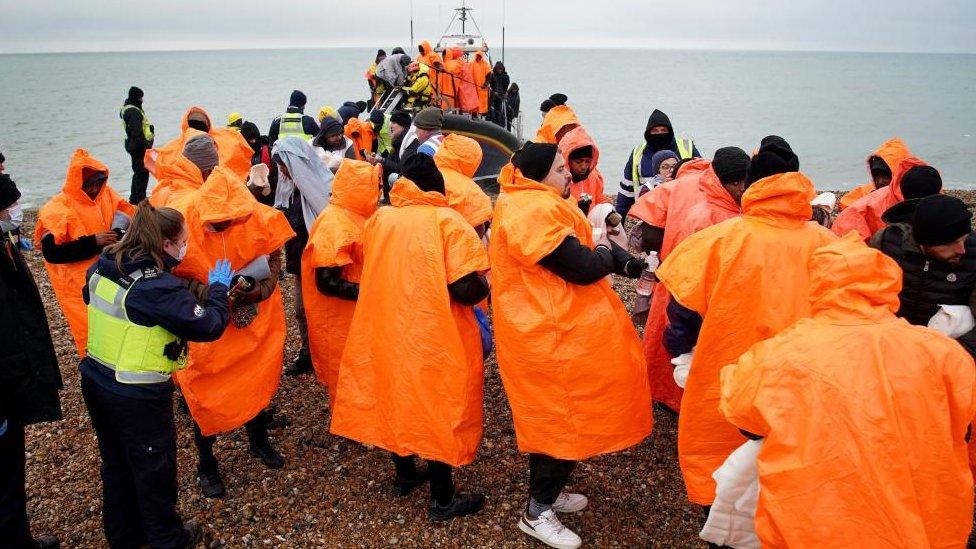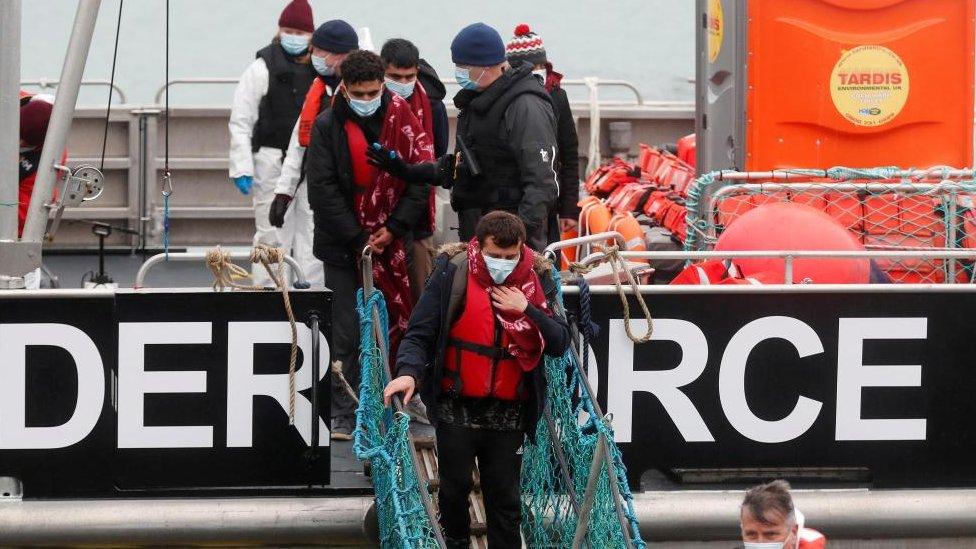Asylum seekers: Will this migrant bill become a reality?
- Published

Suella Braverman told MPs that the government's new plan to stop small boats was "novel" - but the most important words are on the front page of this enormously dense document.
Every bill that is presented to Parliament - big or small - comes with a statement assuring MPs and Peers that the plans respect the UK's human rights rules.
But this time, the home secretary has admitted the plans may not be compatible with the European Convention on Human Rights and could therefore fall at the first hurdle.
Yet this is not deemed a reason for the government to pause - in fact, Ms Braverman and the prime minister say this legislation is necessary to "stop the boats".
Haven't we been here before?
In political terms, yes. This is the second major piece of immigration legislation from this government in two years. Former Home Secretary Priti Patel's bill promised to stop the small boats, partly through creating a rule that anyone arriving from a safe country - basically meaning France - would not have their case considered at all.
It also criminalised unauthorised arrival on our shores - a move that has been recently upheld by senior judges as lawful, even if the individuals are seeking protection.
But those people have not been removed from the UK. Critics say that this emboldens smugglers to convince clients that if they can make it over the English Channel, there's every chance they won't get removed.
So this new plan goes much further. It denies most people arriving from France or another safe country the right to make an asylum claim - even if they may have a case to do so - and places a duty on the home secretary to remove them as quickly as possible. That is an enormous toughening up of the rules - and is just one of the reasons why critics say it breaks the UK's international obligations to treat potential refugees fairly.
Not so, say ministers. The UK takes more than its fair share, they argue. Almost 60,000 Afghans, Syrians and others have come on official schemes in recent years and 220,000 Ukrainians have been given entry visas since February 2022.
What's not remotely clear is whether the plan will have any impact on smugglers. The evidence gathered by my colleagues in France suggests not. Migrants tend not to know what awaits them in the UK.
Is it practically deliverable ?
Assuming the plan makes it through Parliament, there are questions over whether it will work in practice.
Border Force officers will have a new power to detain almost everyone who crosses the English Channel for at least 28 days while the home secretary and her team book them onto flights out of the UK.
Sunak: We've tried every other way and it hasn't worked
But where are these people going to be held? Last year's 45,000 arrivals are equivalent to half of the UK's prison capacity. Holding someone in a secure unit is far more expensive than placing them in a house, flat or hotel room. Prison is famously more expensive than some of the UK's top private schools.
Ministers say they don't expect to be holding anywhere near that number at any one time - but last August almost 9,000 migrants arrived in that month alone. Can the Home Office set up that many secure units before this summer? When the prime minister was asked on Tuesday night where these people would be put, he didn't say.
By the end of those 28 days, ministers say they would want to remove those people to a safe country - but there are few returns agreements in place and no deal at all with the EU since Brexit.
People who are still in detention after 28 days will be able to launch challenges before immigration tribunals arguing that they are being unlawfully held.
This prospect will alarm judges. The current backlog of unresolved immigration cases is just shy of 29,000 with a 46-week wait for a decision.
What about Rwanda? Well that plan is mired in the Court of Appeal. It could take months to rule on whether it's lawful - and then the case will almost certainly go the Supreme Court. It may not rule before 2024.

Is this actually legal?
Throughout the plan the wording aims to limit rights to appeal and to make it harder for arriving migrants to make a claim to stay on.
Supporters say this brings much needed common sense to a system that has too many rights of appeal and delays to allowing ministers to act for the public.
But none of that can do away with the simple fact that the home secretary herself does not know if this plan can succeed. In a letter to MPs, she simultaneously says she believes the plan is workable but it has more than a 50% chance of failing in the courts.
What this means in practice is that her own lawyers have told her it could be torn to shreds if it is challenged as unfair and inhumane.
It is exceptionally rare for a minister to introduce a bill while admitting this possibility. And that in turn would leave MPs asking why they should vote for it in the first place.